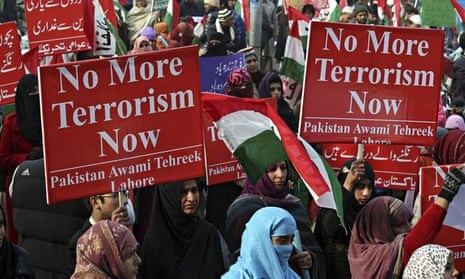Pakistan continued its retribution against terrorists on Sunday with the execution of four more prisoners.
The deaths followed the executions of two other convicted terrorists on Friday amid seething public anger at the massacre of 148 people in the city of Peshawar last week.
Syed Babar Ali, the superintendent of the district jail in Faisalabad, confirmed that Ghulam Sarwar, Akhlaque Ahmed, Rasheed Mehmood and Zubair Ahmed had been executed in the afternoon. The men were convicted for their role in a 2003 attempt to assassinate former military leader Pervez Musharraf with suicide car bombs.
Prime minister Nawaz Sharif decided to abandon a six year unofficial moratorium on executions following the attack on Army Public School in Peshawar, though the decision imperils an EU trade deal.
With many Pakistanis demanding public executions for terrorists, public anger at the slaughter has outweighed other concerns amid fears militants may launch jail break operations against prisons.
Last week some newspapers carried graphic front page pictures of the corpses of Mohammad Aqeel and Arshad Mehmood after they became the first civilians to be hanged since 2008.
Human rights groups are alarmed by the development given the notorious shortcomings of the country’s criminal justice system and the tendency to convict a wide range of criminals under terrorism legislation.
On Tuesday a man called Shafqat Hussain is scheduled to be executed for kidnap and murder, though he was just 14 at the time he was sentenced and has since retracted his confession, which he says was made after nine days of police torture.
Clive Stafford Smith, director of the UK legal charity Reprieve, said there was a “real risk” an innocent man may be executed.
“While the slaughter of innocents in Peshawar was utterly reprehensible, it hardly solves the problem to kill someone who had nothing to do with it,” he said.
Research by Reprieve and the Justice Pakistan Project has found Pakistan’s sweeping counter-terror laws have been abused in order to secure prosecutions. The report estimates that nearly 90% of those sentenced under terrorism laws “had nothing to do with terror at all”.
“Instead of being reserved for the most serious cases of recognisable acts of terror, the anti-terror legislation is in fact being used to try ordinary criminal cases,” the report said.
“Either in a deliberate attempt to evade the procedural safeguards guaranteed by ordinary courts or due to the vague and overly broad definitions of ‘terrorism’ in the legislation.”
Human Rights Watch also called for executions to be halted.
“Pakistan’s government has chosen to indulge in vengeful blood-lust instead of finding and prosecuting those responsible for the horrific Peshawar attack,” said Phelim Kine of Human Rights Watch.
“The government’s death penalty spree is a craven politicized reaction to the Peshawar killings that will do nothing to bring the attackers to justice.”

Comments (…)
Sign in or create your Guardian account to join the discussion